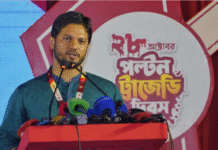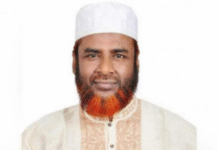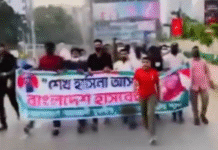For Bangladeshi banks, social responsibility means loyalty to the ruling family

In many countries, banks are encouraged to demonstrate their ethical credentials by self-regulating and giving money back to various causes. This is our understanding of the term corporate social responsibility.
But our research shows that in Bangladesh, corporate social responsibility means something else entirely.
In a country where under-developed democratic institutions, family-led politics and poverty are norms, the social activities of businesses take on a sinister nature. Rather than demonstrating their service to the community, banks in Bangladesh use social activities to show their loyalty to the ruling family.
A family affair
Let’s draw a picture of Bangladeshi family politics and their links with business. Two family-led political parties have been ruling Bangladesh since independence. Former prime minister Khaleda Zia, wife of General Ziaur Rahman, a former president, leads the Bangladesh Nationalist Party, with her son, Tareq Rahman next in line.
The current prime minister, Sheikh Hasina (Wazed), is the daughter of Sheikh Mujibur Rahman, who is widely considered the father of the nation. She leads the Awami League, which has been in power in Bangladesh since 2009, and her son, Sajeeb Wazed Joy is next in line.

Unfortunately, the confrontational politics pursued by these two leading political parties has led to the creation of a culture that permits only wealthy people to be elected to public office
According to the declarations of candidates, 68% of members of parliament elected in 2008 were from the business world. Political patronage has become almost a necessary condition for obtaining government permission to do business.
In 2011, when passing legislation for new banks to open, finance minister Abul Maal Abdul Muhith said that, despite concerns raised by Bangladesh’s central bank about the policy, “It is our political decision to issue licenses for new banks in the country”.
It should come as no surprise, then, that our analysis shows disclosures of social activities targeting the ruling party have been the main theme of corporate reporting. The top four most frequent social responsibility activities reported by banks during 2009-2012 can be traced to the Awami League and its political activities.
Digging into the donations
In our study, we analysed banks’ disclosures and newspaper publicity between 2008 and 2012. We reviewed company reports for the period 2009–2012 of all listed and non-listed local banks operating in Bangladesh (a total of 39).
Of the 39 local banks, 16 (two state-owned, nine private and five development banks) either did not produce any information on their corporate social responsibility activities, or produced insufficient information to warrant inclusion in our investigation. Therefore, our final analysis is based on 23 banks over a period of four years.
We found contributions to the Liberation War Museum suddenly appeared in company accounts from 2010 onwards. Bankers also lined up to contribute to Prime Minister Sheikh Hasina’s relief funds for tragic events, such as the Bangladesh Rifles mutiny, a failed rebellion in 2009, and the Nimtoli fire tragedy in 2010.
In the case of donations to the Liberation War Museum and Victory Monument, the establishment of which was a 2009 election promise of the Awami League, there were 19 donations made by banking companies over the course of four years. The donations began soon after the election of the government; each bank donated exactly the same amount to the cause.

Donations to the field of autism were also a recurrent feature of disclosures by banking companies in 2012. In 2011, the prime minister’s daughter Saima Wazed was appointed the chair of the autism advisory committee to the government and made some appearances in the media supporting the new cause.
Photo opportunities
Photographs showing cheques being handed over directly to the prime minster are a prominent feature of annual reports.
Over the four years we studied, all sampled banking companies posted at least one photograph showing their chairs handing over cheques to the prime minister in their annual reports, as part of their reporting of corporate social responsibility activities.
Banks disclosed and publicised a number of other social activities directly linked with the current prime minister and her family. For instance, expenditure on advertising the prime minister’s achievements, such as receiving a “South-South” award, was designated as corporate social responsibility in Southeast Bank’s annual report for 2012.
The same bank donated towards highlighting the image of Bangabandhu, Sheikh Mujibur Rahman – considered in Bangladesh to be the “father of the nation”, who is also the father of the current prime minister.

Basic Bank classified donations to educational institutions in Gopalganj district, the prime minister’s electoral constituency, and placing wreaths at the Bangabandhu memorial as part of their corporate social responsibility. And the annual report of Standard Bank referred to the prime minister as the jananetri (meaning “leader of the masses”), a political term used only by members of the Awami League to refer to their leader.
Donations were made by Jamuna Bank to the Sheikh Jamal football club, named after the prime minister’s late brother. Rupali Bank helped help fund a documentary on the life of Bangabandhu. All of these are classified as social activities.
What’s missing
Bangladesh is not country with strong transparency legislation and limited disclosure of corporations’ trading activities has previously been a concern.
A recent World Bank report on accounting and auditing highlights how few disclosures public limited companies make in Bangladesh. So the fact that banks are lining up to disclose these social activities is quite revealing in itself.
And with all the publicity around the donations that relate to the ruling family, there are serious gaps in the reports of other social activities by Bangladesh’s banks.
Of particular concern is the absence of environmental projects. While contributions to environmental causes are encouraged by the country’s central bank, none featured in any of the bank’s balance sheets.
The annual reports are notable for absence of any reference to global standards. The International Finance Corporation (IFC) sustainability framework recommends companies disclose their performance against eight social and environmental indicators, while the Global Reporting Initiative (GRI) has sustainability reporting guidelines for voluntary use by organisations. Neither framework is mentioned in the reports.
According to accounting firm KPMG’s survey of corporate responsibility reporting in 2015, GRI initiative is the most popular voluntary reporting guideline worldwide. Corporate responsibility reporting in line with GRI guidelines is now treated as standard practice
Bangladesh’s banks have not the IFC’s suggested social and environmental performance frameworks, nor have they considered GRI as their reporting framework.
In Bangladesh, disclosure to demonstrate loyalty to the ruling family appears to have much greater value for corporations than disclosure made for legal reasons.
Source: http://theconversation.com










Excellent article.